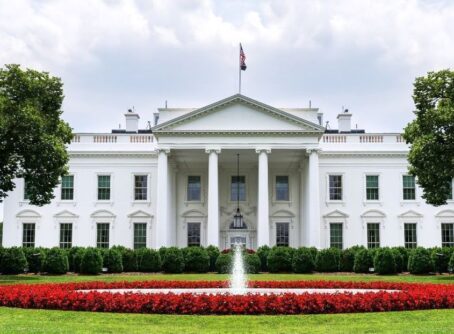
A newly modified regulation that applies to all Department of Health and Human Services (HHS) grants is now in effect. The regulation bans discrimination on the basis of sexual orientation and gender identity (SOGI) across 13 HHS funding programs that include a prohibition on sex discrimination. At the same time, the regulation provides a new way for faith-based organizations with religious objections to an HHS requirement to be protected in their noncompliance.
The HHS Grants Regulation, which applies to all departmental grants, including HHS funds sent to state and local agencies before federal dollars are awarded to private organizations, includes a section setting out “statutory and national policy requirements” (45 CFR 75.300). Following the U.S. Supreme Court’s 2015 Obergefell decision requiring marriage equality, the Obama administration modified the Grants Regulation in its final days to require HHS grantees to accept same-sex marriages as valid and to not discriminate on the basis of SOGI or religion. No exemption was provided for religious organizations. In 2019, the Trump administration suspended enforcement of the regulation and also proposed to revise it. The Trump administration’s revised regulation simply required grantees to obey all nondiscrimination rules required by law. But this truism had an effective date more than two weeks after the end of the administration, and due to both court and Biden administration actions, the Trump revisions did not come into effect. Now the Biden administration’s new version of the Grants Regulation governs HHS grants.
The focus of the Biden changes is to apply the Supreme Court’s Bostock decision of 2020 to HHS grants, which interpreted Title VII’s prohibition on sex discrimination in employment to also entail the prohibition of SOGI discrimination in employment. Although the Court specifically said its decision applied only to Title VII (employment), with this regulation and in many other executive actions the Biden administration insists that wherever sex discrimination is prohibited, SOGI discrimination must be forbidden also.
Thirteen of HHS’s grant programs include a ban on sex discrimination and are affected by the revised regulation. Among these programs are two that include Charitable Choice language (SAMHSA drug treatment funding and the CSBG program), Head Start, and various services for refugees, homeless people, low-income communities, and others. Visit this HHS webpage for a list of the programs. Even if Bostock legitimately can be stretched beyond Title VII to apply to all of these programs, it is not clear that a SOGI nondiscrimination requirement can be applied to all of them identically, given that sex discrimination is not treated the same in each. A comment letter sent by CPJ’s Institutional Religious Freedom Alliance (IRFA) and others in response to the regulation when it was proposed includes a detailed discussion of this and other concerns.
The positive news is that HHS responded to our criticism and that of others by strengthening religious freedom protections in the finalized regulation. Subsection (f) now states that grantees and grant applicants “may rely on applicable Federal protections for religious freedom and conscience” such that the new nondiscrimination requirements “shall not be required where such protections apply.” The subsection then describes how these protections apply to an organization with a religious or conscientious objection to a requirement. (The same protections and procedures are now part of the regulation implementing Section 1557, the nondiscrimination provision of the Affordable Care Act.)
An organization may ask HHS for a written exemption, stating which requirement is problematic and what the legal justification is for the exemption. With a written exemption, the organization will have an answer in hand for officials or others who argue that it is violating the law with its policies and practices or who say that it is ineligible to apply for funding. However, exemption requests and HHS responses are subject to being made public and might be used to generate opposition to the organization.
An organization does not need to apply for a written exemption to be exempt. If it is confident in its exemption status, it can simply decline to follow the requirement that conflicts with its convictions. If its decision not to comply is based on a “good faith” understanding of the requirements and protections but it is later charged with discrimination and found not to be exempt, HHS will not penalize it for its past action. However, the organization will have to change its actions in the future. To receive this “good faith” protection, an organization would do well to consult with an expert attorney and ask for a letter for its files that explains why the organization is exempt.
Suppose that the organization is sure it is exempt from needing to comply with some requirement, has not applied to HHS for a declaration of exemption, but now is being charged with violating the regulation, perhaps by a beneficiary who claims to have suffered illegal discrimination. Subsection (f) says that the organization may apply to HHS, stating the problematic requirement and the reasons why an exemption applies (check that “good faith” letter from the attorney!)—and it will automatically receive a temporary written exemption that is valid unless and until HHS determines that there is no legal justification for the claimed exemption. The organization can appeal for reconsideration of an adverse decision.
The Biden administration’s broad interpretation of the Bostock decision, extending far beyond the actual Court ruling, along with its ongoing efforts to limit religious freedom protections, will likely lead to various legal challenges to the HHS Grants Regulation. If President Biden is not reelected, it is expected that the next administration will take multiple actions to revise many regulations. However, faith-based organizations should not assume there is no way for them to partner with government programs. As always, grant and contract terms should be carefully reviewed, and expert legal advice should be sought. Note that many revised regulations, such as the HHS Grants Regulation, include significant institutional religious freedom protections.
Additionally, regardless of what a regulation states, the Religious Freedom Restoration Act and other First Amendment protections still apply. Organizations should not presume they are excluded but should instead expect to be eligible for government funding intended to be equally available to both faith-based and secular organizations.
Stanley Carlson-Thies is the Founder and Senior Director of the Institutional Religious Freedom Alliance (IRFA), a program of the Center for Public Justice.




